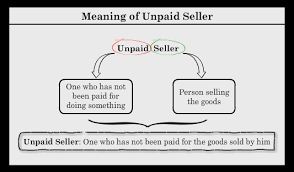

Unpaid seller
Introduction
(1) The seller of goods is deemed to be an “unpaid seller” within the meaning of this Act—
(a) when the whole of the price has not been paid or tendered;
(b) when a bill of exchange or other negotiable instrument has been received as conditional payment, and the condition on which it was received has not been fulfilled by reason of the dishonour of the instrument or otherwise.
(2) In this Chapter, the term “seller” includes any person who is in the position of a seller, as, for instance, an agent of the seller to whom the bill of lading has been endorsed, or a consignor or agent who has himself paid, or is directly responsible for, the price.
Definition of unpaid seller
According to Section 45 of the Sales of products Act, 1930, an unpaid seller is any person who is in the position of a seller, such as an agent or a consignor, and is defined as a seller who has not yet received the whole price for the products or a portion of it. Put differently, an unpaid vendor is a seller who has not received payment for all or a portion of the products they have sold.
What Rights Do Unpaid Sellers Have?
In the event that the buyer defaults, the unpaid sellers are entitled to a number of rights under the Sales of Goods Act, 1930. The purpose of these unpaid sellers’ rights is to safeguard the seller’s interests and make sure they may get their money back in the event that the buyer doesn’t pay. The unpaid seller’s rights are:
- Lien Rights of Unpaid Seller
The right to liens is one of the most significant rights of an underpaid seller. A lien is the right to keep ownership of the goods until the buyer has paid the entire amount due. If the items were sold on credit and the customer hasn’t paid the entire amount yet, the unpaid seller may use this right.
Until payment is received, the seller is free to hold onto the items and refuse to provide them to the buyer until the entire amount owed has been paid. Even if the items have been shipped but have not yet been delivered to the customer, the seller may still use their right of lien.
That being said, there are requirements that must be met before the seller can use the lien rights. Section 47 of the Sales of items Act, 1930 states that the seller may exercise the right of lien in the following situations: a) The items were sold on a cash basis, meaning there was no credit stipulation.
- b) The buyer runs out of money, or is unable to make their debt payments when they’re due.
- c) The goods were sold on credit, but the seller hasn’t received the entire amount due despite the credit term having passed.
The seller may exercise their right of lien and keep possession of the items until the entire price is paid if these requirements are satisfied.
The sellers in Grice v. Richardson had delivered two of the three tea packages that were part of the deal, but they had not received payment for the third. Until the amount was paid, they were permitted to keep the goods. The seller cannot keep the remaining amount, nevertheless, if there is an agreement to waive the lien for the provided items.
The Indian Supreme Court ruled in a case that an unpaid seller is entitled to impose a lien on the goods and hold them until the buyer pays the balance. The court additionally stated that neither the fact that the products have been given to a carrier for transmission to the buyer nor the fact that the seller has asserted an interest in the items due to the buyer’s insolvency affects the seller’s right to lien.
- Right of Unpaid Sellers to Stop Selling While in Transit
The right of halt in transportation is a crucial one for unpaid sellers. This privilege comes into play when the products are in transit, meaning that the buyer has become insolvent and the goods have been shipped by the seller but not yet delivered to them. The seller is able to halt the products’ passage and reclaim ownership of the goods in this scenario. With the use of this power, the seller can stop the products from being delivered to the bankrupt buyer and pursue payment for their outstanding balance.
If the buyer’s financial situation changes after the goods have been sent but before they are delivered, the seller may exercise their right of halt in transit. This right can be used by the seller to stop the goods from being delivered to the buyer by giving notice to the carrier or any other bailee in possession of the items.
The goods are considered to be in the seller’s custody after the notice is provided, and the seller may choose to keep them until the entire amount owed is paid or sell them to recoup their losses.
It is crucial to remember that the seller only has the ability to terminate a transaction in progress if the buyer declares bankruptcy. Even though the money hasn’t been received, the seller cannot use this right if the buyer is not insolvent.
The seller in Great Indian Peninsula v. Hanmandas had consigned goods to GIP Railway Company for the buyer’s conveyance. When the products arrived at their destination, the business put them onto the buyer’s cart. However, before the cart left the railway compound, a telegraph was received requesting that the goods be stopped. The seller filed a lawsuit against the corporation for damages when it failed to comply. According to the court, the moment the products were given to the buyer marked the conclusion of the transportation.
In a different case, the court decided that if the buyer becomes insolvent after the items have been shipped, the unpaid seller has the right to halt the goods in transit. The seller does not need to physically intercept the goods in order to exercise their right to stoppage in transit; the court concluded that this right accrues as soon as the seller learns of the buyer’s insolvency.
- Unpaid Seller’s Right to Resell the Products
In some situations, the unpaid seller is also entitled to resell the items, according to the Sales of items Act, 1930. In accordance with Section 48 of the Act, the seller may sell the products to recoup their obligations if they have used their lien or halted the items in transit and the buyer has not paid the price within a reasonable amount of time.
The vendor has two options for selling the goods: private sale or public auction. The seller is obligated to give the items to the buyer if the buyer pays the money before the resale, but they must warn the buyer of their intention to resell the goods. In addition, the seller has the right to hold the buyer liable for any losses resulting from nonpayment of the purchase price.
It is significant to remember that, should the items need to be resold, the seller is required to act in good faith and use reasonable efforts to obtain the greatest price.
Buyers who suffer losses from the seller’s carelessness or misconduct in the resale may be able to sue for damages if the seller sells the products for less than what could have been acquired.
There was an agreement for the $850 sale of two cars—a Vanguard and a Zodiac—in the case of R v. Ward v. Bignall. Despite being given ample notice, the buyer did not pay the whole amount and only paid a $25 deposit. After that, the seller tried to sell the automobiles again, but she was only able to get $359 for the Vanguard. $475 in damages—the remaining balance of the purchase price plus $22 for advertising costs—were sought by the seller. The seller can only be compensated for advertising costs and the difference between the purchase price of the Vanguard and the actual amount of the goods, the court ruled, and the contract is nullified once the seller resells the goods.
- Right of the Unpaid Seller to Sue for the Price
The seller may also sue the buyer for the cost of the items if they are unable to enforce their lien or stoppage rights during transit or if they choose not to resell the products.
Even in cases where the buyer has not yet received ownership of the items, the seller may nonetheless file a lawsuit for the full purchase price against them under Section 55 of the Sales of items Act, 1930.
When the agreed-upon payment period has elapsed or the buyer has falsely refused to pay for the products, the seller may file a lawsuit against the buyer to recover the full price of the goods, interest, and any damages. If the buyer runs out of money before the products’ ownership has transferred to them, the seller may also file a lawsuit to recover the purchase price.
It is crucial to remember that, whether the contract or the law demands it, the seller must inform the buyer of their plan to suit for the amount. The seller’s right to sue for the price must be asserted, and failing to give notice may impact that right. The notification must be given within a reasonable period after the right to sue for the price has arisen.
- Sellers’ Unpaid Rights to Damage Claims
An unpaid seller’s rights include the ability to sue for the price as well as damages for any losses incurred as a result of the buyer’s default. The seller is entitled to damages for any loss suffered if the customer willfully fails to pay for the products, willfully ignores them, or refuses to accept them.
The specific facts of the case and the seller’s real loss will determine how much damage the seller is able to claim. If the buyer had complied with their duty to accept and pay for the goods, the seller is entitled to damages for the loss of profit. In addition, the seller may pursue damages for any further costs—such as storage or shipping fees—that are incurred as a result of the buyer’s default.
It’s crucial to remember that the seller has an obligation to mitigate damages, which calls on them to take appropriate action to reduce their losses. The court may lower the maximum amount of damages that can be demanded if the seller does not attempt to lessen their losses.
- Unpaid Seller’s Right to Keep the Items
An unpaid seller may also be able to keep the products until their debts are settled in specific circumstances. As to Section 46 of the Sales of items Act, 1930, an unpaid seller who possesses the items is entitled to hold them until the price is settled or the buyer fulfills any outstanding obligations.
Similar to the right of lien, the right to keep the items extends beyond situations in which they were sold on credit.
Even if the products have been sold for cash, the seller may keep them in their possession as collateral for the buyer’s payment of the purchase price or other obligations. The seller may only use this option, though, if they actually own the products or have the legal authority to do so.
- Right of Unpaid Sellers to Terminate Agreement
An unpaid seller may also terminate the sale agreement and treat it as if it never happened under specific conditions. Section 49 of the Sales of products Act, 1930 states that the seller may refuse to deliver the products and treat the agreement as terminated if the buyer has become insolvent and the seller has not yet delivered the items.
Rescission of the contract denotes the seller’s ability to end it and release themselves from its obligations. In addition, the seller has the right to keep any advance payments paid by the buyer and pursue damages for any losses incurred as a result of the buyer’s default.
It is crucial to remember that the seller can only cancel the agreement if the customer declares bankruptcy prior to the items being delivered. The seller’s ability to terminate the agreement and pursue other remedies, such a lien, a stoppage in transport, or the resale of the items, ends after the products are delivered.





